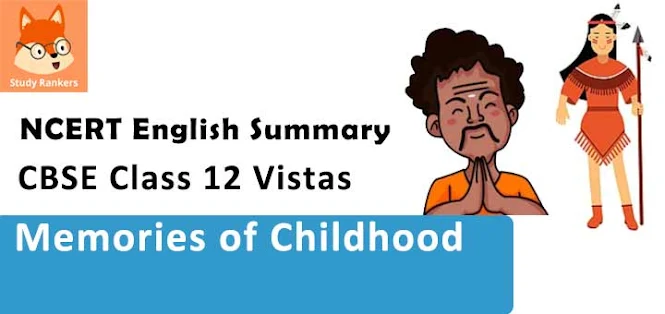Summary of Memories of Childhood by Zitkala-Sa & Bama Class 12 English Vistas

Notes for The Cutting of My Long Hair
- The first part deals with the account of Simmons, An American Indian, who fought against the prejudices of the society against American Indians.
- She describes her experiences on her first day at the Carlisle Indian School.
- The customs and rules of the place were strange and new to her.
- She was forced to wear clothes that were considered undignified in her culture.
- At breakfast, she was embarrassed as she did not know the routine of the place.
- When she comes to know that they were planning to cut her hair, she protests by hiding under the bed, even though she knew it was futile. In her culture, it was the cowards whose hair was shingled.
- She felt like an animal driven by a herder.
The Cutting of My Long Hair Summary in English
Her friend who could understand some English, told her that the pale strange woman intended to cut her long hair. Zitkala-Sa learned from her mother that hair would be shingled only for the unskilled warrior, cowards and mourners.
She decided to fight back and got herself hidden in a dim room under the bed. Everybody looked for her and called her name but eventually caught. Her long hair was cut, although she resisted a lot. She spent her rest of the life there like a small animal being a part of a herd, which was driven by a herder.
Summary of The Cutting of My Long Hair in Hindi
Notes for We too are Human Beings
- The second part is an excerpt from the autobiography ‘Karukku’ by Bama – a Tamil Dalit.
- She was in her third grade when she becomes aware of the indignities that the lower caste people face.
- She happens to see an elderly person from her community abase himself in front of a higher caste person as he was not supposed to touch the food that he was ordered to fetch for the landlord.
- Later, her brother explains to her that the incident was not at all funny as she initially thought, but very pathetic. The people from the lower caste were treated as untouchables.
- She was deeply saddened and decided to study hard to overcome discrimination.
We too are Human Beings Summary in English
Bama was a student of third class. She never heard of the word untouchability during her childhood. Certain small events of her life made her feel that she was born in the marginalized caste. She was a happy peppy girl and once when she was in the third class, while going home she saw her people working hard for their land- lords. In spite of their hard work the landlords treated the workers very humiliatingly. She saw from the direction of the market an elder from their community was coming with a parcel in his hands. The manner he carried the poly bag, the manner he was carrying it with its strings, without touching the Vadas inside the parcel, really made him to be funny. He handed over the parcel to the landlord very sacredly too. She narrated the incident to her brother, taking the incident as humorous and funny. He told that it was not humorous but humiliating as the elderly person was not supposed to touch the item inside the parcel. On hearing that Bama felt infuriated.
She saw her people bowing, to the upper caste people. She was enraged why her elders work so hard for those people who despised them so much. She wanted her people to stop paying undue respect and reverences to these upper caste people. Her brother told her that if they study hard and make progress in their lives, it would help them in throwing away the indignities. Education is their weapon with which they fight back the society. Bama did the same and got many friends in her life. Education made her as double- sided sward to fight very sharply against the unjustified caste system.
